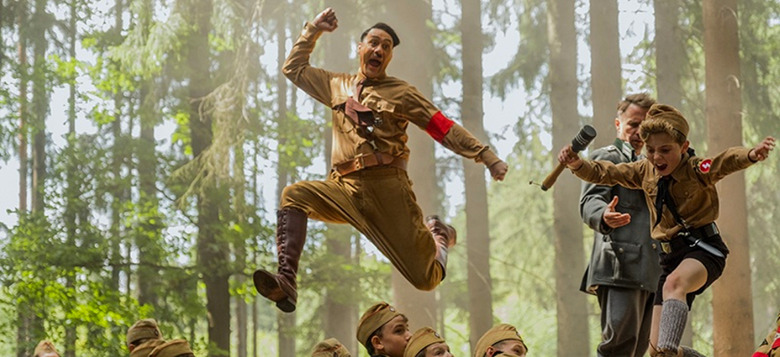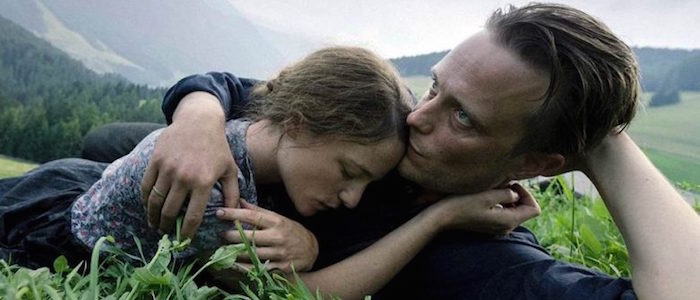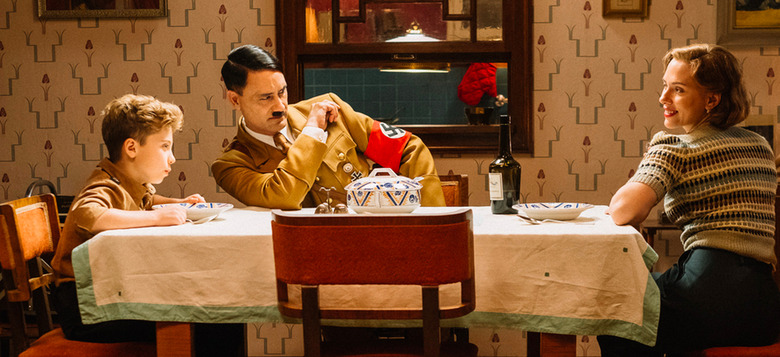'Jojo Rabbit' And 'A Hidden Life' Offer Alternate And Equally Compelling Takes On Fighting Back Against Nazis [TIFF]
It's been over ten years since Brad Pitt's Lt. Aldo Raine instructed audiences that the "Nazi ain't got no humanity" in Quentin Tarantino's Inlgourious Basterds. In the decade that followed, we watched as a quaint, yet uproarious tale of obliterating Nazis turned from celluloid fantasy to real-world nightmare. Various films have tackled the real-world threat of the revival of insidious ethnonationalist ideology, most notably Spike Lee's BlackKklansman in 2018, which drew a direct parallel between the inability to fully extinguish the insidious threat of white nationalism in the 1970s to the 2017 neo-Nazi march in Charlottesville that claimed the life of Heather Heyer.
Whether past is prologue or merely an instruction manual to navigate recurring and unresolved social tensions, it was hard to ignore the spectre of Nazi Germany at the 2019 Toronto International Film Festival. Václav Marhoul's The Painted Bird, a bleak story of a young Jewish boy wandering Eastern Europe after being separated from his parents during World War II, reportedly prompted mass walkouts. Dan Friedkin's Lyrebird, acquired by Sony Pictures Classics, made fewer waves with its story of how a member of the Dutch resistance investigated art stolen by the Nazis.
But by far the most notable films to grapple with the Third Reich came from Fox Searchlight's two most pedigreed ponies for the fall season, Taika Waititi's Jojo Rabbit and Terrence Malick's A Hidden Life. On the surface, these films could not appear more different. Waititi's energetic, irreverent style is at one formal extreme, and Malick's reverential, brooding aesthetic represents another. Yet the films share more than just their obvious similarity of depicting characters quietly resisting the authoritarian impulses of Nazi Germany. Both, in their own way, celebrate the power of the individual to make a difference in the fight against evil regimes.
“What They Could” – Jojo Rabbit and Melting Away Resistance to the Resistance
In an apocryphal tale of cinema history, legendary director Luis Buñuel and Charlie Chaplin went to a screening of Leni Riefenstahl's Nazi propaganda film Triumph of the Will. Buñuel reacted with pure terror, recognizing this fascistic documentary's power to sway audiences. Chaplin, meanwhile, laughed "so hard he actually fell off his chair." He found the martialing of resources for the deification of Adolf Hitler risible, and the state apparatuses designed to legitimize his authority absurd.
While Taika Waititi's Jojo Rabbit is far from the rallying cry for our shared humanity that Chaplin's anti-Nazi satire The Great Dictator represents, it's hard not to see a little bit of shared DNA in their approach to the presentation of Hitler's Germany. Like Chaplin, Waititi reimagines the Führer as an object of humor and pathetic ridicule – not to downplay his danger, but to expose how performance masks reality. The grandiosity is but a deflection from his own smallness and insecurity.
Like Adenoid Hynkel, Chaplin's allegorical rendering of Hitler in The Great Dictator, Waititi also depicts (and plays on-screen) a fantasy Führer. The dictator exists as an imaginary friend to the film's protagonist, the well-meaning yet totally inculcated Hitler youth Jojo (an extraordinary Roman Griffin Davis). It's clear from the jump that this is not meant to be the Adolf Hitler, and in case there was any doubt, there's a scene early on where the dictator's face changes from Waititi's rendering to the historical figure on propaganda posters that Jojo plasters all over his town.
Many people who saw the film at TIFF pointed out the perils of portraying such a dangerous person as a relatively harmless figure who's decontextualized from the atrocities he oversaw. These voices hold merit. There's a thin line between irreverence and insensitivity, and it's one one which Waititi gleefully dances. But, from my perspective, he comes down on the right side because the film is not just provocation for its own sake.
Jojo Rabbit's representation of Hitler serves a purpose beyond the obvious joy in mocking the ludicrous theatricality of the regime. Leaning into the caricature is to understand why so many people fall for him and other demagogues. They identify with a figure who reflects, as well as validates, their own anxieties and grievances. For many like Jojo, they literalize the way they feel like this political figure talks personally to them.
Waititi's illusory autocrat decreases in screen time and intensifies in petulance as Jojo gains increased exposure to both the humanity of Jewish people and rational thought. After a weekend at a Hitler youth camp in which he's humiliated after being unable to snap a rabbit's neck, he comes home to discover his mother Rosie (Scarlett Johansson) has been hiding the young Jewish refugee Elsa (Thomasin Mackenzie) in their walls. Jojo and Elsa's repeated interactions serve to dispel some of the most grotesque lies about Jews that the Nazis have implanted in his mind, such as them all having horns. On a deeper level, Jojo begins to see her as a person in full – even when she's mocking him – and not some nebulously defined "other."
Jojo Rabbit celebrates these ordinary and individual acts of resistance, be it Rosie sheltering Elsa, Jojo coming to see her personhood or other Nazi officials surprisingly committing covert subterfuge. Waititi's film mirrors Jojo's personal journey with a widening frame of reference that comes to more fully understand the scope of injustice occurring in Germany. At one point in the film, he and Rosie encounter a stockade where four hanged bodies lie dangling in the wind. "What did they do?" Jojo asks earnestly. "What they could," his mother replies.
It's a little muddled whether Waititi associates these acts with the downfall of the regime, which comes swiftly and somewhat unexpectedly in the film (frankly, with fairly little internal logic). But Waititi's interest lies primarily within the one, not the many. It's a story of how a mother's courage and a young Jewish girl's defiance begins to break down entrenched barriers of prejudice around an otherwise tender-hearted boy. The film never plays like he believes there are "very fine people on both sides." Jojo Rabbit makes the case that no one is ever too far lost in their fanatical devotion to a tyrannical leader to be reached by reason.
“The Anvil Outlasts the Hammer” – A Hidden Life and Monumental, Futile Courage
The protagonist of A Hidden Life, Franz Jägerstätter, starts from a much different baseline than Jojo. The German army conscripts this simple, decent Austrian farmer into its ranks. The experience immediately sends him on a spiritual odyssey where he questions whether he can pledge allegiance to such a brute. Terrence Malick's roving, inquisitive camera (in the hands of DP Jörg Widmer) captures his mental tussling; while it might not be Malick's most formally daring work, it expertly applies his impressionistic aesthetic to a fitting subject. The film's patient runtime that nears three hours gives him plenty of space to be human and grapple with his many doubts. But Franz's initial instinct proves a commitment to which he will hold steadfast for years – he will not support Hitler.
In his resistance to the Third Reich, Franz possesses no grand hopes of sparking a revolution. His decision not to declare loyalty belongs to himself only, though it ripples out and affects his wife and children as the whole family becomes pariahs in their Edenic village. "You can't change the world, the world's stronger," he's told. Time and again, friends and allies urge him to simply profess allegiance publicly and maintain his opposition privately. The losses he and his family will experience cannot possibly outweigh the benefits of a mostly internal moral victory.
Yet Franz remains firm in his convictions, clinging to the love of his devoted (if conflicted) wife and the tenets of his Christian faith when all else falls away. He cannot count on civic officials in the village, who now spew open xenophobia, or the institutional church, which no longer contains a backbone. For posing no physical threat to the Third Reich, Franz faces imprisonment, which he takes in stride with little defiance. "Mine is the smallest of crosses," he humbly declares.
Franz's choice removes him from the sustaining love of his family, which is punishment enough, but he's taunted and encouraged to renege on his principles by a parade of doubters. "Do you think the authorities will find out about your defiance?" he's asked. Franz knows his resistance is likely futile. But the argument most likely to make him sway falls along these lines – do you even matter? What purpose does it serve to be good if the universe does not hear you? These long sequences in prison echo the temptations of Christ by Satan in the wilderness. To secure his physical well-being, it would cost him nothing – except his soul.
In spite of all the entreaties to abandon his integrity, Franz sustains his conscientious objection to the very end. He's a fascinating figure to Malick because while he struggles with the why of his decision, he's rock solid on that what. Someone encourages him to lie for the sake of his freedom, an entreaty to which Franz replies, "But I am free." He understands the cosmic scope in which his decision sits and acts accordingly. He and his family struggle to understand the immediate implications of his resistance, questioning why such bad things can happen to such good, faithful members of the flock. Yet they trust that, in the grand scheme of things, the divine purpose of it all will reveal itself and outweigh any earthly punishment.
“Partly Dependent on Unhistoric Acts” – Where Waititi and Malick Converge
Malick closes A Hidden Life with the following quote from George Eliot's Middlemarch, though the postscript would function equally as well before the credits of Jojo Rabbit as well:
"The growing good of the world is partly dependent on unhistoric acts; and that things are not so ill with you and me as they might have been, is half owing to the number who lived faithfully a hidden life, and rest in unvisited tombs."
They approach from wildly different perspectives: Waititi reveling in the ludicrous zeal of the converted, Malick revering the ardor of the immune. But each professes faith in the power of the individual doing what they can to make a difference. On their own, they cannot bring down an empire. But resistance is a force that ripples outwards in their understanding, altering the bounds of what is considered possible and eventually accumulating until it reaches a point of critical mass.
Tales of organized resistance against the Third Reich are plentiful, dating back to the fall of the government and even extending to more recent films like Valkyrie, Defiance and Anthropoid. There's not but hints of groups devoted to fighting Nazis and protecting their targeted victims in either film. Franz's struggle in A Hidden Life exists entirely in a vacuum, unconnected to any larger efforts to counter Hitler's influence. In Jojo Rabbit, there's a sense that Rosie belongs to some kind of organization devoted to protecting Jews. Yet Waititi never shows such a network, relegating his film to focus solely on this one case of a sheltered girl.
There are practical reasons for these filmmakers to limit their scope. People often have a hard time understanding concepts like resistance in an abstract sense, and film provides a great service in putting a human face on them. Personification becomes difficult when dealing with a large group as keeping track of a full ensemble takes up a lot of mental energy, and it makes mapping characteristics to characters more difficult. And, on an emotional level, it's far easier to get caught up in a single protagonist's journey of opposition to Nazism – and to feel inspired by the power of the individual to have an impact within a seemingly all-encompassing system.
Yet, in 2019, fighting illiberal forces and autocratic governments is not merely a filmic fantasy. For many across the globe, it is either a reality or a coming attraction. Do Jojo Rabbit and A Hidden Life measure up to the moment? Not that Waititi or Malick must cater to contemporary sensibilities, but both filmmakers feel a little old-fashioned in their belief in the power of the one. All can and should do their part to fight bigotry and anti-democratic forces where they see them expressed in society. But with the threats bigger and more insidious than ever, perhaps it's time for a filmmaker to take a page from Robin Campillo's BPM or Mike Leigh's Peterloo, just to name two recent examples of film that effectively dramatized the power of collective democratic action. There's value in the resistance of the individual, but there's true power in the organization of the many.
***
Fox Searchlight will release Jojo Rabbit on October 18 and A Hidden Life on December 13.



